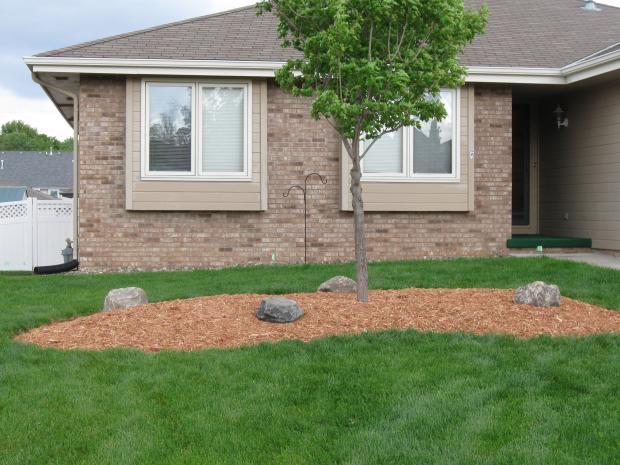
Mulch is the term used for a variety of organic products which are applied to your garden as decorative ground cover, as a soil improvement, and to conserve water usage. Bark mulch is one of the most popular mulches available, and comes in bark chips of varying shapes and sizes. Besides bark mulch, wood mulch also comes in a number of other varieties that feed the soil as they decompose, improve the looks of your garden, and help retain soil moisture all at the same time.
Which Type of Wood Mulch Is Best for Me?
With a wide range of wood based mulch to choose from, it can be difficult to decide which type to lay down over your garden beds. Here’s a list of the most common types, and why, or why not, you should choose these mulches for your landscaping needs.
- Bark Mulch is one of the most popular mulches around, because it looks so great once you put it down. It is also an excellent choice when it comes to water conservation, since it provides a solid barrier against moisture evaporation. The one downside of this mulch is its size. Most bark mulch comes in large chips, which decompose slowly. If you can find bark that’s been shredded, go that route. Shredded bark will not only trap moisture in your flower beds better than large chips, but since it decomposes quicker, it more readily adds nutrients to the soil as well.
- Cedar Mulch is the cream of the crop. Because cedar mulch has natural oils in the wood that repel insects, it’s the perfect choice for wood mulch, especially in areas where termites are common. Cedar mulch is going to be a little more costly initially, but it’s well worth the extra expense when you consider its pest repellant properties.
- Colored Mulch is another popular mulch alternative. It’s usually composed of wood chips or shredded wood that has been died a reddish color. If you are particular about the appearance of your landscaping, colored mulch is the way to go. It can’t be rivaled when it comes to appearance. Of course, good looks come at a price. If you choose colored mulch for your gardens, make sure your budget can accommodate the extra costs.
- Natural Colored Mulch refers to wood based mulch that is not colored for aesthetic appeal. Many homeowners choose to go this route, since naturally colored wood chips are usually cheaper than dyed alternatives. They provide the same benefits when it comes to moisture retention, week reduction, and composting properties, but they don’t carry the extra price tag that goes hand in hand with dyed varieties.
- Pine Peelings, or other wood shavings, are basically the cast of material of more intricate milling processes. They are then collected and sold in bulk as wood mulch. This variety of mulch won’t turn as many heads as bark mulch or cedar mulch, but it serves its purpose. If you’re on a tight budget, but still looking for wood mulch for your gardens, look for pine or other wood peelings at a local lumber yard or wood supplier.
Bark Mulch Warning
Whether you choose bark mulch, or another variety, it’s important that you take into consideration the prevalence of wood boring pests in your area before you purchase. Termites, for example, prefer to munch on dead wood, and wood based mulch is a favorite feeding ground. If you live in an area where termites are commonplace, it’s probably a good idea to talk to a pest control contractor or landscaping contractor before making your purchase. It can be the difference between a maintenance free landscape, and one that causes scores of headaches and larger problems down the road. If termites are not a problem in your area, wood mulch is about the best investment you can make when it comes to landscaping. You’ll be getting one of the best looking, and performing, mulches on the market.
 Raising Chickens at Home
Raising Chickens at Home  Spring Garden Flower Tips and Suggestions
Spring Garden Flower Tips and Suggestions  Plan Ahead for a Better Yard
Plan Ahead for a Better Yard  Dry Well Cleaning & Maintenance Tips
Dry Well Cleaning & Maintenance Tips  French Drains
French Drains 

what is the exactly differences between live and dead mulch??
What type of bark mulch you need? One of those questions that the answer should be “it depends”. What is your short and long term goal. Cedar mulch is the best when it comes to reducing problems with termites and resists decomposition, cedar bark lasting longer is an issue if you are wanting to create compost quickly to fertilize the soil while using bark. It would be faster to use other barks like oak, maple, locust to mulch when enriching the soil. Adding organic material will aid in adding nutrients into the soil and plants. The faster the organic material decomposes the faster the nutrients are available for the plants.